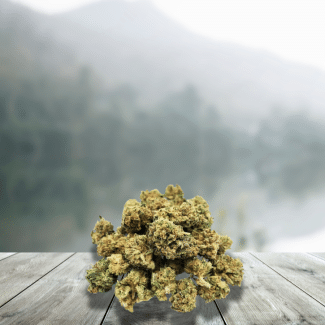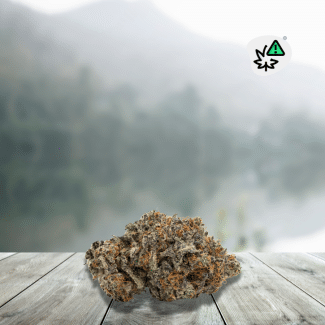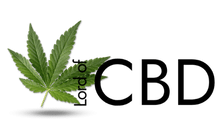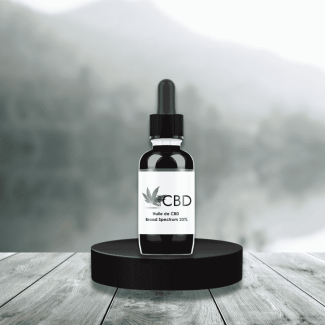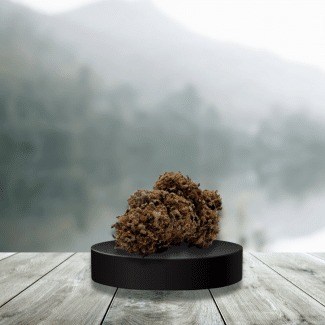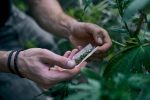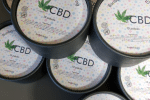
Cannabidiol, better known as CBD, has attracted growing interest around the world. The question of when is the best time to take CBD is frequently asked, and so it is essential to approach this subject with expertise and precision. This question reflects a need to understand how CBD interacts with our body and how to optimize its effectiveness. In this article, we are going to dive deep into this topic by looking at various aspects of CBD consumption.
Understanding CBD: What is CBD?
Cannabidiol (CBD) is a compound found in the cannabis plant. Unlike THC, CBD does not produce psychoactive effects and is therefore used for a variety of medical and therapeutic reasons. According to Healthline , CBD is being studied for its potential anti-inflammatory and anti-anxiety effects.
How does CBD work?
CBD works by interacting with the body's endocannabinoid system (ECS), which plays a role in regulating various bodily functions. WebMD reports that CBD can help regulate pain, inflammation, and even mood disorders.
Benefits and uses of CBD
- Pain and inflammation : CBD is often used to manage chronic pain.
- Anxiety and depression : It can help reduce symptoms related to these disorders.
- Sleep problems : Some find that CBD helps improve sleep quality.
When to Take CBD: A Detailed Exploration of Ideal Timing
The question of “when” in taking CBD can be as crucial as the “how” or “why”. In fact, the time of day you choose to take this cannabinoid can have a huge impact on its effectiveness depending on your goals. Here are some aspects to consider:
Morning: Natural Energy
Why in the morning?
If you are among those who struggle to start the day, incorporating CBD into your morning routine could be beneficial. Users have reported that CBD gives them a sense of focus and mental clarity.
How to integrate it?
A CBD-enriched smoothie or a few drops of CBD oil in your morning coffee can work wonders. However, consult a healthcare professional to make sure this option is right for you.
Le Midi: The Midday Elixir
Why at noon?
The afternoon period is often synonymous with a drop in energy and concentration. CBD can then act as a balancer, helping you get through the day without feeling overloaded with stress.
How to integrate it?
You can take CBD capsules or even CBD-infused snacks to maintain your energy and concentration levels.
Evening: Towards a Restful Sleep
Why in the evening?
CBD has been studied for its potential effects on sleep quality. So if you have trouble relaxing or sleeping, taking CBD in the evening may be a good idea.
How to integrate it?
CBD herbal tea can be a pleasant way to end the day. Or, you can opt for a few drops of CBD oil under the tongue an hour before bed.
Before or After a Meal?
According to research, CBD absorption is better when taken with foods high in fat. So you might consider taking CBD with a meal to maximize its effects.
According to the Objective
Your purpose for taking CBD (pain management, reducing anxiety, improving sleep, etc.) should guide the timing of its consumption. For pain management, for example, it might be more beneficial to take CBD at regular intervals throughout the day.
According to the Form of CBD
CBD oil and tinctures generally have a faster effect than edibles or capsules. If you are looking for an almost immediate effect, opting for a dye could be ideal.
According to the Person
It is essential to remember that each individual is unique. The effectiveness of CBD can vary from person to person, making it essential to adjust the timing based on your own reactions and needs.
Consultation with a Health Professional
To maximize the benefits of CBD, a medical consultation can be very useful. A professional can help you personalize your experience based on your general health, your specific needs and any medications you may already be taking.
As you can see, the best time to take CBD can vary greatly depending on many factors. Taking the time to understand your specific needs and consulting a healthcare professional will allow you to optimize the benefits you could derive from this fascinating molecule.
The Science Behind CBD: An In-Depth Exploration
Cannabidiol (CBD) has generated considerable interest both in the medical field and among the general public. There are many claims circulating about its supposed benefits, but what does the science say? Let's take a closer look at this.
Clinical Studies on CBD
Range of Searches
Numerous studies have explored the potential of CBD in various contexts ranging from pain and anxiety management to its use in cases of epilepsy. Scientific databases like PubMed list hundreds of articles devoted to CBD research.
Promising Results
Some studies have found promising results, including in relieving chronic pain, reducing anxiety, and even treating some forms of epilepsy. However, it should be emphasized that the majority of these studies are still at a preliminary stage.
CBD metabolism
Hepatic Metabolism
CBD is primarily metabolized by the liver. This process can be influenced by various factors such as food consumed, age, and liver health.
Bioavailability
The bioavailability of CBD can also be affected by the form in which it is consumed. For example, bioavailability is generally higher when taken in oil form compared to capsules.
Drugs interactions
It is crucial to consult a doctor before starting to take CBD, especially if you are on other medications. CBD may interact with certain medications, such as blood thinners, by altering their metabolism.
Quality and Safety
Quality control
The quality of CBD is a crucial factor in its effectiveness and safety. Make sure you buy products that have been tested by third-party labs and whose reports are publicly available.
Potential Contaminants
Poor quality CBD products may contain contaminants like heavy metals or residual solvents, which pose health risks.
Legal Considerations
Legality Variable
The legal status of CBD is far from uniform globally. In some countries, CBD is completely legal, while in others it may have strict restrictions.
Potential Side Effects
Although generally considered safe, CBD is not without side effects. Among the most commonly reported are dry mouth, changes in appetite, and fatigue.
CBD science is a rapidly evolving field. Although many studies have shown promising results, the research is still in its early stages. Caution is therefore required, particularly with regard to drug interactions and product quality. As always, a medical consultation is recommended before starting any new supplement or treatment.
Experiences and Testimonials: A Personal and Professional Look at CBD
CBD has been the subject of much discussion, both in the media and in academic circles. But what about the actual experiences of people who have tried it? Here's a look at consumer testimonials, advice from health experts, as well as my personal experience.
Consumer Testimonials
Diversity of Experiences
The diversity of testimonials reflects the range of uses of CBD. Some people talk about relief from chronic pain, others talk about better management of stress and anxiety, while some report improvements in more serious conditions like epilepsy or even certain cancer symptoms.
Impact on Quality of Life
Many users report a significant improvement in their quality of life. For example, patients with joint pain have reported a reduction in their discomfort after starting a CBD regimen.
Advice from Health Experts
General Recommendations
Health professionals, including doctors and naturopaths, often recommend CBD as a possible addition to a more comprehensive health regimen. However, they emphasize the need to consult a doctor, especially if you are taking other medications or have pre-existing medical conditions.
Personalization of Treatment
Expert advice can be very helpful in adjusting the dosage and method of administration of CBD according to the specific needs of each individual. They can also help you decode third-party lab test results, to ensure you are consuming a quality product.
My Personal Experience
Anxiety Management
As an author who has personally experienced CBD, I find it to be a great supplement in my anxiety management. I started with a small dose and adjusted until I found the level that worked for me.
Improved Sleep
I also noticed a significant improvement in my sleep quality. Before using CBD, I often woke up several times during the night, but now my nights are more restful.
The experience with CBD is as diverse as the people who use it. User stories and advice from health experts contribute to a growing body of information that can help new users make informed choices. My own journey with CBD has been largely positive, reinforcing the idea that this cannabinoid has a place in modern wellness. But as always, consultation with a qualified healthcare professional is essential before starting any new health regimen.
FAQ: Everything you need to know about CBD
CBD, or cannabidiol, has generated many questions among those interested in its multiple therapeutic applications. Here is an expansion of frequently asked questions to help you better understand this fascinating compound.
When is the best time to take CBD for sleep?
Planning
If your primary goal is to promote better quality sleep, it is generally recommended to take CBD in the evening, a few hours before bed. This gives the CBD time to start working on your system.
Dosage
Dosage can also play an important role. A small dose may have a slightly energizing effect, while a larger dose may have a more sedative effect. It is therefore crucial to dose correctly according to your specific needs.
Can I take CBD with other medications?
Caution and Consultation
It is essential to consult a doctor or pharmacist before mixing CBD with other medications. CBD may interact with certain medications, altering either their effectiveness or their side effects.
Known interactions
Interactions between CBD and medications such as anticoagulants have already been observed. Therefore, use extreme caution and always consult a qualified healthcare professional.
Is CBD legal in my country?
Regional Variations
The legality of CBD is a complex issue that varies from country to country, and sometimes even from region to region within the same country. Some places allow CBD as long as it contains less than 0.3% THC, while others ban it completely.
Verifications
It is crucial to check local or state laws before making a purchase or traveling with CBD products.
How long does CBD stay in the system?
Variable Factors
CBD can remain in the system for a period of 2 to 5 days, but this duration can vary depending on several factors, such as method of administration, individual metabolism, and frequency of use.
Which form of CBD is best for me?
Personalized Choice
CBD tinctures and oils are often recommended for a quicker effect, while edibles and capsules can offer a longer but more moderate effect. The choice really depends on your personal needs and administration preferences.
Can CBD cause side effects?
Possible Side Effects
Yes, although generally considered safe, CBD is not free of side effects. These effects, although rare, can include symptoms such as dry mouth, changes in appetite, or even diarrhea.
Precautions
If you experience unwanted side effects, it may be helpful to consult a doctor to adjust your dosage or discuss other treatment options.
CBD is a complex and constantly evolving subject. For safe and effective use, it is always best to consult a healthcare professional and do your own research to understand how CBD can fit your specific needs.
The question of when is the best time to take CBD is complex and depends on many factors. Whether you are new to the world of CBD or an experienced user, this article aims to provide you with complete and accurate information to help you make an informed decision. Understanding your needs, goals, and the science behind CBD can help you find the optimal time to consume this versatile and beneficial compound.



